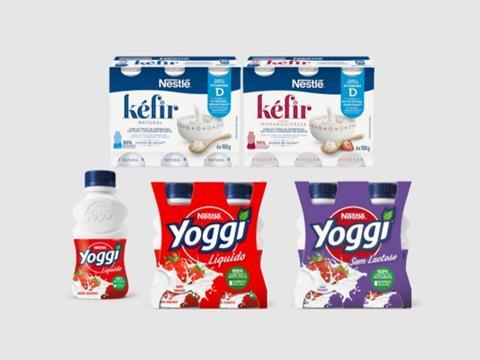
Lactalis Nestlé says that it has incorporated up to 30% recycled polyethylene (PE) content into some of its chilled dairy product bottles using ISCC PLUS certified recycled material from Repsol’s advanced recycling process.
Since June this year, Lactalis Nestlé claims it has been using 30% recycled PE in its Nestlé Kefir range bottles produced in Guadalajara for Spain and Portugal, as well as 10% recycled PE in its Yoggi brand drinking yoghurt bottles marketed in Portugal. These contents are reportedly certified according to the ISCC PLUS mass balance approach.
Repsol adds that it uses advanced recycling technologies to process plastic waste typically unsuitable for mechanical recycling, apparently turning it into a raw material that can be used to manufacture new, food contact products. The company says that its materials meet the food industry’s high quality and hygiene standards.
According to the companies, the entire value chain – from Repsol as a supplier of the material, through to Logoplaste, the manufacturer of the bottles in the Lactalis Nestlé factory in Guadalajara, and Lactis Nestlé itself, which oversees the filling of the bottles – has the ISCC PLUS certification. This apparently ensures the traceability of the recycled materials used throughout the process.
Lluis Farré, general manager for southern Europe at Lactalis Nestlé, comments: “Being able to use recycled plastic to manufacture our bottles represents an important step in the way to circularity.
“However, everyone’s commitment is the key to this initiative’s success. Starting with the consumer, by separating the label from the bottle and disposing of both elements in the yellow container, to the agents such as Repsol, Logoplaste, and Lactalis Nestlé, who jointly promote the circularity of packaging in direct contact with food.”
Pablo Giner, polyethylene business director at Repsol, adds: “We thank Lactalis Nestlé, a benchmark in its sector, for its trust in Repsol to turn this important alliance into a reality and thus enable us to achieve our shared goals in Food Safety and Sustainability and boost our commitment to support our customers in their transition to circularity.”
Nestlé is part of the Carbios consortium, which is trialling the use of an enzymatic recycling technology, C-ZYME, for which an industrial demonstration plant was recently opened. Earlier this year, the company also joined Mars, Mondelez International, PepsiCo and Unilever in pledging to increase investments with the aim of accelerating a circular economy for flexible packaging in Europe.













